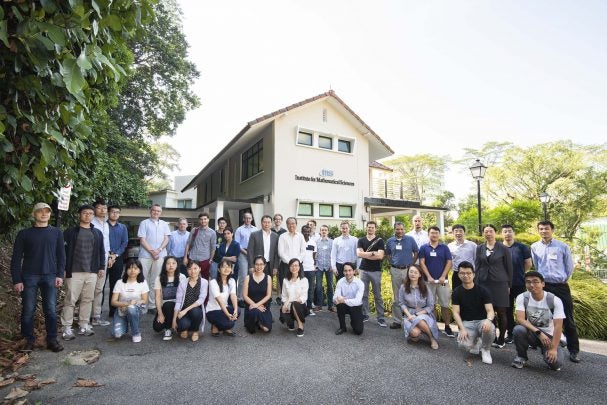| |
The 4th Berlin-Princeton-Singapore Workshop on Quantitative Finance, organized by NUS’s Institute for Mathematical Sciences and Risk Management Institute and supported by Humboldt University of Berlin and Princeton University, was held from 18 to 20 March 2019. A total of 21 speakers were invited from universities such as Hong Kong University of Science and Technology, Humboldt University of Berlin, NUS, Princeton University, Ritsumeikan University, Shanghai Advanced Institute of Finance, and Technische Universität Berlin. Day one of the two and a half day workshop featured nine presentations on topics such as portfolio liquidation models, asset securitization, systemic risk, bitcoin mining, liquidity, market prediction, investments, logistic regression, and optimal liquidation. Day two featured seven presentations on topics including, trading and market impact, default contagion, EVE correlation models, portfolio diversification and model uncertainty, and optimal portfolio liquidation among others. Lastly, the half-day program on 30 March, featured five talks on topics related to non-concave portfolio optimization, optimal investment and consumption, stochastic resilience, Poisson autoregressive model, etc. Following the Workshop on Quantitative Finance, the HUB-NUS Workshop on Fintech took place on 21 March 2019. This event was hosted by RMI, IMS, and Humboldt University of Berlin. The one-day workshop was held at RMI and was attended by nearly 80 participants. To reach a wider audience, the workshop was also broadcasted live via a platform called SEED. Ten speakers were invited to the workshop to give a 30-minute presentation each. They came from NUS, Hong Kong University of Science and Technology, Humboldt University of Berlin, Pavia University, and MarketPsych. The topics that were discussed included topic sentiment asset pricing, value driven feature selection, investing with cryptocurrencies, optimal stopping via reinforced regression, vector error correction models, risk factor mapping, VCRIX, sentimental markets, utilizing high-dimensional high-frequency data for lower sampling frequencies, and variable selection with big data. The above events are a part of the IMS Program on Quantitative Finance, which will continue its activities in July and August with three more workshops on Stochastic Control in Finance (22 – 26 July 2019), Fintech and Machine Learning (5 – 8 August 2019), and Asset Pricing and Risk Management (26 – 30 July 2019).
|
|


